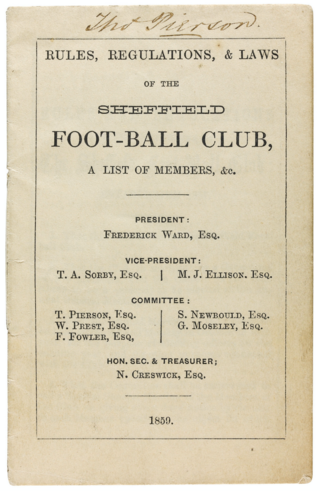
Ebenezer Cobb Morley was an English sportsman. He is regarded as one of the fathers of the Football Association (FA) and modern football.

The Sheffield Rules was a code of football devised and played in the English city of Sheffield between 1858 and 1877. The rules were initially created and revised by Sheffield Football Club, with responsibility for the laws passing to the Sheffield Football Association upon that body's creation in 1867. The rules spread beyond the city boundaries to other clubs and associations in the north and midlands of England, making them one of the most popular forms of football during the 1860s and 1870s.

Charles William Alcock was an English sportsman, administrator, author and editor. He was a major instigator in the development of both international football and cricket, as well as being the creator of the FA Cup.
1867 was the 81st season of cricket in England since the foundation of Marylebone Cricket Club (MCC). Yorkshire achieved a perfect season in first-class cricket, something not likely to be equaled on covered pitches due to the high frequency of drawn matches, and even beforehand much more difficult due to the increased scoring after 1870, produced by the usage of a heavy roller and the disappearance of the abundant shooters, which previously made batting very tough. The season is, however, best known for a schism between the northern and southern professionals that led to the North v South game, one of the major "representative" fixtures of the time, being suspended for several years because northern professionals refused to play in London for want of better conditions.
Crystal Palace F.C. was an amateur football club formed in 1861 who contributed to the development of association football during its formative years. They were founder members of the Football Association in 1863, and competed in the first ever FA Cup competition in 1871–72.

N.N. Club or N.N. Kilburn—N.N. standing for "No Names" —was an amateur English football club based in the Kilburn district of London.
Crusaders Football Club was an English association football club based in London. It was a founder member of the Football Association.

Arthur Pember was a British sportsman, stockbroker, lawyer, journalist and author, notable for serving as the first president of The Football Association from 1863 to 1867.
Alfred Joseph Baker was an English amateur sportsman who scored England's goal in the first representative match against a Scottish XI in March 1870. By profession, he was an auctioneer.
Gilbert George Kennedy was a Scottish amateur sportsman who played for the Scottish XI in the second international football match against England. He was also a regular member of the Wanderers club and an occasional cricketer. By profession, he was a police magistrate and Justice of the Peace.

Gamos (1867–1893) was a British Thoroughbred racehorse that won the 1870 Epsom Oaks. Sold to William Graham as a yearling, Gamos won six out of eight starts as a two-year-old in 1869, but failed to improve her racing form after the 1870 Oaks. Gamos raced until she was four-years-old and retired from racing in 1871. Gamos was not successful as a breeding mare and died in 1893 after being sold for £15 in 1890.
Hampstead Heathens F.C. was an English football club, based in Hampstead, London. The club competed in the first ever FA Cup in 1871 and were involved in the first ever competitive replay in association football.
Philip Hilton was an English cricketer. He played 33 first-class cricket matches between 1865 and 1874. He was a regular club cricketer and was on the management committee of Kent County Cricket Club, for whom he played 26 of his senior matches.
Barnes Football Club is an association football club in Barnes, London. The club had great importance in the development of the game in the nineteenth century and was the first team ever to win a match in the FA Cup.
Robert Watson Willis was a British sportsman. He served as the second secretary of the Football Association from 1866 to 1867, succeeding Ebenezer Morley. He also served on the FA's committee from 1867 to 1872.
This was the sixth season of Barnes Football Club.
This was the seventh season of Barnes Football Club.
Clapham Common Club, usually known by its initials C.C.C., was a mid-nineteenth century amateur English football club based at Clapham Common.